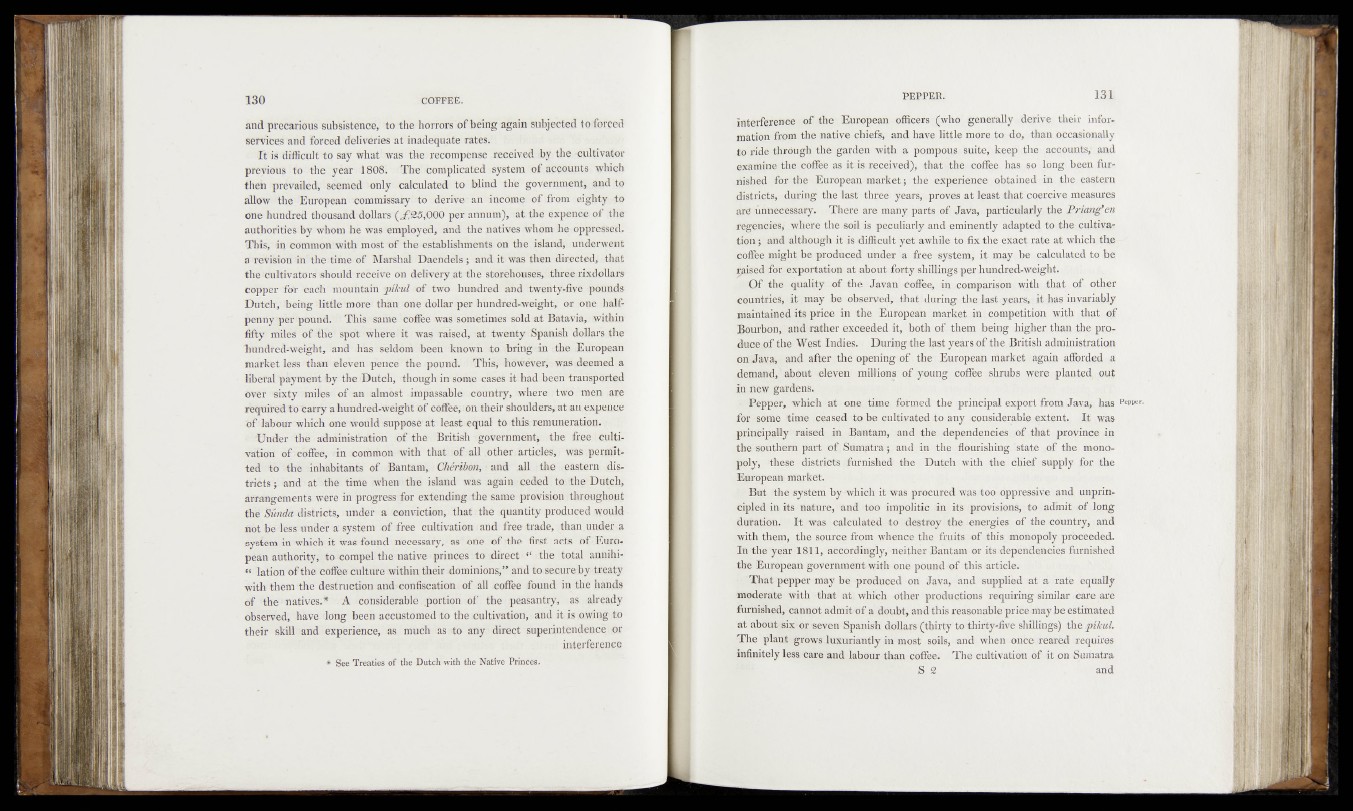
andprecarious subsistence, to the horror« of being again subjected toiforçed
services and forced deliveries at inadequate rates.
•It is difficult to say what was the recompense .received by »PPBHpWfaf
previous to the year 1808. The complicated system of accounts which
then prevailed, seemed only calculated to blind the government, and to
allow the European commissary to derive an income of from eighty to
one hundred thousand dollars •(c£’SS,000 per annum), iat the expence of the
authorities by whom he was employed, and the natives whom he oppressed.
This, in common with most of the establishments on die island, underwent
a revision in the time of Marshal Daendels ; and it; was then directed, that
the cultivators should receive on delivery at the storèhouses, three rixdollars
copper for each mountain pikul of two hundred and twenty-five pounds
Dutch, being little more than one dollar per hundred-weight, or one halfpenny
per pound. This same coffee was sometimes sold at Batavia, within
fifty miles of {He spot where:it was raised, at twenty .Spanish dollars the
bündreâ-weight, and bias seldom been known .to bring in Jhç European
market less thaneleven pence the pound. This* however, wasfdeemed a
liberal payment by the dDatch, though in some cases ithadibéen transported
Over sixty miles; of an almost impassable country, where., two1- are
required to carry a hundred-weight of coffee, . on. their shoulders, atanexpenee
Of labour which one would suppose* at least equal to this; remuneration,
s o r t e r idle admimstiattion Of the British government the face Lejalti-
vàtion of coffee, -in common with that of all .other;articles,; was,permitted
to .the .inhabitants of Bantam, Chéribm, • and all ;the reasterji .districts
;. and ■ at'vffie time when - the island was again .ceded, to.fthe Dutch,
arrangements were in progress for extendi ngs/fhe same provision ; throughput
thé Swnda districts, under a conviction, that .the ^quantity produced jWQ'uld
fiot be less'under a system of free cultivation and: free trade,,•than.under ..a
system in which it was found .necessary, as~ one of-the first acts f|;S¥S#r
pean authority, to ioempel the native • .princes to ^direct <c rtlîë total annihi-
« lation of the coffee culture within their .dominions,” .and to aeoureby-tteaty
with them the destruction and -confiscation, of all coffee found in the hands
of the - natives.* A considerable .portion of the peasantry,, as already
observed’, -have long been accustomed itb the .cultivation, and it. is owing to
their skill and experience, as much as >to any • direct superintendence i or
interférence
# See Treaties o f the Dutch with the Native Princes.
interference of the European officers (who generally derive their information
from the native chiefs, and have, little more to, do» than occasionally
to ride through the garden with a pompous, suite, keep the accounts,* and
examine the .cOffefe as it us. received)» that-the coffee has so long been furbished
for the European market j , the experience qbtained in- the eastern
districts» during the last three- years, proves at least that popreive measures
arC -unhecfeSSary. There are many parts of Java, particularly the Pricing? en
regencies,- wh'ei;e-the sofi is peculiarly and. eminently adapted to the;culti<var
tion i and although it is difficult yet .awhfie.t©. fix.thp exact rate at which the
coffee^might, be produced under a free system, it may be calculated to be
mised for exportation at about, forty shillings per hundred-.weight. •'.!.
- Of the quality -of -the Javan eoffeq, in.comparispn with that. Ofi other
countries,•-'■•it- may be observed,,teatiffuringrthejast years,;it has invariably
maintained its price in the European marketein. competition, with that erf
Bourbon,, and rather exoeed.ed.it, 'both of! .them being, higher, than.jthe pror
duce^fftibe-West Indies, k During the last years .of the British administration
on,Java, and after the opening of the. European market again afforded £
demand,*'about eleven- millions of young coffee shrubs were,,planted,, out
in new gardens.
‘--Pepper, which at one. time formed the principal export from Java, has
for-some tirrie>Geased -to be cultivated to any .considerable extent. If was
principally raised in Bantam, and the dependencies o f that province in
tfee'-'s'duthem part; of Sumatra:; and in the flourishing state .of the monopoly
» rthegeij districts (furnished.' the Dutch with -the chief supply for lithe
European nfarfeSt.'
But J^he-syStem by-which it was procured was-tooioppressive..and unprincipled
in. its nature,-’and too impolitic -in its ^provisions,'to;; admit .of long
duration. It was calculated to ,id^troy -the-energies' of the country,. and
MSKtitem.r thfe.^oiirce from whence, the fruits -of this Monopoly- proceeded.
In the year 1811, accordingly, -neither -Bantam-or its .dependencies furnished
the »European governmd«t'withpone pound-of‘tiiis-article.
• That pepper may be produced on Java, and supplied at a rate equally
•moderate with that at. Which other productions requiring similar .care are
furnished, cannot admitu'f a doubt, and this reasonable price-may be estimated
at abdut-six-or »seven-Spanish dollars-(thirty to’thirtydive shillings) the .pikul.
The plant grows .luxuriantly in most soils, and when -once--reared requires
infinitely less care and labour than coffee.' The cultivation of it on Sumatra
I S 2 ! 1 and